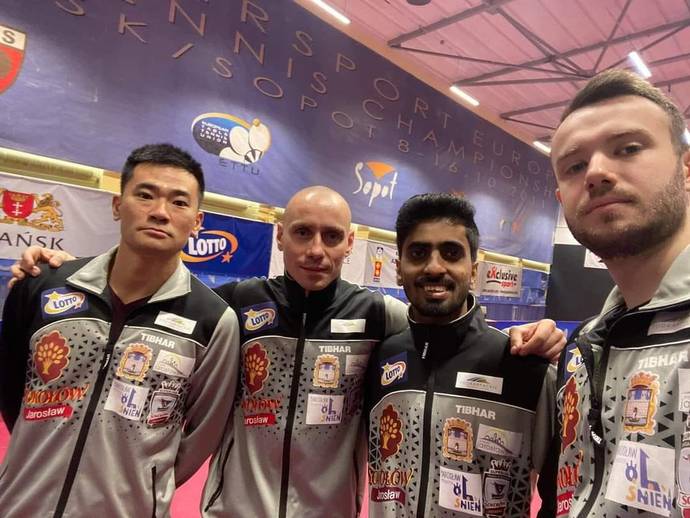When one door closes, promises the platitude, another one opens. For Sathiyan Gnanasekaran (pictured, second from right), this is doubly true. The Indian ace is the face of the Dabang Delhi TTC, one of the top teams in the Ultimate Table Tennis (UTT) league. Winners in 2018, Dabang Delhi settled for second last year to the Chennai Lions, led by Gnanasekaran's Indian teammate and rival Sharath Kamal Achanta. With each of the six superstar league teams combining top Indian players with fellow world-class international stars, it was fixing to be another epic season for UTT. Then, of course, 2020 happened. With the COVID-19 pandemic still raging, the UTT announced on Friday the postponement of league play until 2021. While Gnanasekaran was surely disappointed not to get another shot at the league championship this year, he had other issues to worry about on top of the full-time job of keeping himself and his close-knit family safe. Due to the COVID-19 lockdown, the globetrotting Gnanasekaran was confined to home with his family in Chennai. Although unable to compete, he made the most of his time by training with an Amicus table tennis robot. Working with his coach, Subramaniam Raman, via video conferencing, Gnanasekaran downshifted to a slightly slower racket but upgraded to spinnier rubber. He also focused on sharpening his service and receive game. "My serving and receiving is good, but when you compare it to the world's top 20, or the top 10 players, there's definitely a long way to go," said Gnanasekaran, ranked 32nd in the world. "These two aspects are very critical to break into the next level. During the lockdown when I didn't have anyone to practice with, the best thing I could do was work on my serve and receive." Staying sharp with his robot, Gnanasekaran awaited the resumption of international competition. When his Polish Superliga team, Sokolow S.A Jaroslaw, called him up, he jumped up ready to go. Unfortunately, he was unable to secure his visa in time to play in the season opener, nor in week two. He watched helplessly from home as his team slid further and further down the rankings. Gnanasekaran finally made his Polish League debut on October 16, a whopping 224 days after his last competitive match. Due to the logistical hurdles of traveling during the pandemic, he arrived only an hour before his first match. "I know that I will be rusty," he said beforehand. "I'm not expecting to win much. When you return to the competition mode after a long break, there is a loss of rhythm. The pressure of playing a match hits you heavily." Struggling to warm up in the cold Polish hall, Gnanasekaran nonetheless got back to his winning ways against rival club AZS Awfis Balta, recording a 4-1 decision over left-hander Szymon Malicki of Poland. "It's a great feeling to start with a win despite not being at my best," said Gnanasekaran, who helped his club to a 3-1 victory. "I was quite rusty and my game was on and off... Hopefully, I can take this momentum into the upcoming matches." So far, it appears he can. In today's league matchup against Olimpia-Unia, Gnanasekaran fell behind 0-2 against Russian defender Maxim Chaplygin. Summoning his experience, Gnanasekaran rallied to force the deciding game, a nail-biter which he clenched 11-9. Buoyed by the dramatic win, Sokolow S.A Jaroslaw swept Olimpia-Unia to remain undefeated with Gnanasekaran. With results like these, it is not surprising that Gnanasekaran's services would be in demand all over the world. This year, he became the first Indian player to be signed by the elite Japanese T-League, inking a contract with the Okayama Rivets. While travel restrictions remain an unpredictable variable, the demand for Sathiyan Gnanasekaran's services remains constant. This is in large part to his proactive approach to the lockdown, using the unplanned break in competition to improve not only the technical aspects of his game but his overall fitness. With any luck, perhaps more doors will close for him.
More at Olympic Channel
